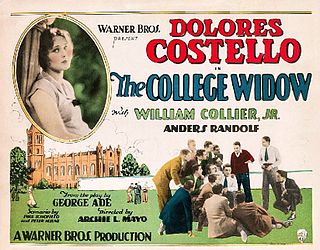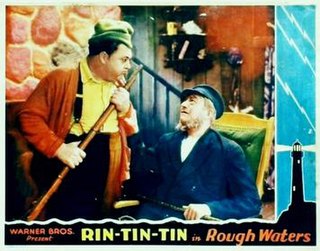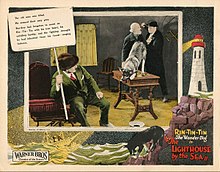
Warner Bros. Entertainment Inc. is an American entertainment conglomerate headquartered at the Warner Bros. Studios complex in Burbank, California, and a division of Warner Bros. Discovery. Founded in 1923 by four brothers, Harry, Albert, Sam, and Jack Warner, the company established itself as a leader in the American film industry before diversifying into animation, television, and video games and is one of the "Big Five" major American film studios, as well as a member of the Motion Picture Association (MPA).

Jack Leonard Warner was a Canadian-American film executive, born in Canada, who was the president and driving force behind the Warner Bros. Studios in Burbank, California. Warner's career spanned some 45 years, its duration surpassing that of any other of the seminal Hollywood studio moguls.

Rin Tin Tin or Rin-Tin-Tin was a male German Shepherd born in Flirey, France, who became an international star in motion pictures. He was rescued from a World War I battlefield by an American soldier, Lee Duncan, who nicknamed him "Rinty". Duncan trained Rin Tin Tin and obtained silent film work for the dog. Rin Tin Tin was an immediate box-office success and went on to appear in 27 Hollywood films, gaining worldwide fame. Along with the earlier canine film star Strongheart, Rin Tin Tin was responsible for greatly increasing the popularity of German Shepherd dogs as family pets. The immense profitability of his films contributed to the success of Warner Bros. studios and helped advance the career of Darryl F. Zanuck from screenwriter to producer and studio executive.

Darryl Francis Zanuck was an American film producer and studio executive; he earlier contributed stories for films starting in the silent era. He played a major part in the Hollywood studio system as one of its longest survivors. He produced three films that won the Academy Award for Best Picture during his tenure.

Matthew Reginald Sheffield Cassan was an English-American actor.

The Sea Hawk is a 1940 American adventure film from Warner Bros. that stars Errol Flynn as an English privateer who defends his nation's interests on the eve of the launch of the Spanish Armada. The film was the tenth collaboration between Flynn and director Michael Curtiz. Its screenplay was written by Howard Koch and Seton I. Miller. The rousing musical score by Erich Wolfgang Korngold is recognized as a high point in his career. The film was both an adventure and a period piece about Elizabethan England's struggles with Spain. It was also meant as a deliberately pro-British propaganda film to build morale during World War II and to influence the American public into having a more pro-British outlook. King Philip was presented as an allegorical Hitler..

Destination Tokyo is a 1943 black and white American submarine war film. The film was directed by Delmer Daves in his directorial debut, and the screenplay was written by Daves and Albert Maltz, based on an original story by former submariner Steve Fisher. The film stars Cary Grant and John Garfield and features Dane Clark, Robert Hutton, and Warner Anderson, along with John Ridgely, Alan Hale Sr. and William Prince.

Operation Pacific is a 1951 black-and-white World War II submarine war drama from Warner Bros. Pictures, produced by Louis Edelman, and written as well as directed by George Waggner. John Wayne and Patricia Neal star and Ward Bond and Philip Carey play supporting roles.

Louise Fazenda was an American film actress, appearing chiefly in silent comedy films.

William Collier Jr. was an American stage performer, producer, and a film actor who in the silent and sound eras was cast in no less than 89 motion pictures.

The Show of Shows is a 1929 American pre-Code musical revue film directed by John G. Adolfi and distributed by Warner Bros. The all talking Vitaphone production cost $850,000 and was shot almost entirely in Technicolor.

The Sea Hawk is a 1924 American silent adventure film about an English noble sold into slavery who escapes and turns himself into a pirate king. Directed by Frank Lloyd, the screen adaptation was written by J. G. Hawks based upon the 1915 Rafael Sabatini novel of the same name. It premiered on June 2, 1924, in New York City, twelve days before its theatrical debut.

The Silent Flyer is a 1926 10-episode (chapter) American adventure film serial directed by William James Craft. The film serial was sold to Universal Pictures for $75,000 with the resulting funds used in the founding of Mascot Pictures.

While London Sleeps is a 1926 Warner Bros. film about a police-dog, Rinty, who helps Scotland Yard defeat a dangerous criminal organisation known as the Mediterranean Brotherhood that operates out of the Limehouse district of London. Walter Morosco wrote the screenplay. It was the first of many films directed by Howard Bretherton, and one of several created for Rin Tin Tin, a German Shepherd dog used in films during the 1920s and 1930s. The film was also released with a Vitaphone sound-on-disc soundtrack with a music score and sound effects, and only the sound discs survive today. The British release prints censored the more horrific aspects of the film.

Won Ton Ton, the Dog Who Saved Hollywood is a 1976 American comedy film directed by Michael Winner and starring Bruce Dern, Madeline Kahn, Teri Garr and Art Carney. Spoofing the craze surrounding Rin Tin Tin, the film is notable for the large number of cameo appearances by actors and actresses from Hollywood's golden age many of whom had been employees of Paramount Pictures, the film's distributor.

The College Widow is a 1927 American silent comedy film produced and distributed by Warner Bros. and directed by Archie Mayo. The film is based on the 1904 Broadway play of the same name by George Ade and was previously adapted to film in 1915 with Ethel Clayton. The 1927 silent film version is a starring vehicle for Dolores Costello.

Rough Waters is a 1930 all-talking adventure drama film that directed by John Daumery and starring Rin Tin Tin. The film was adapted by James A. Starr from a story by Lillie Hayward, and was the last Rin Tin Tin film produced by Warner Bros.
Robert Knapp was an American actor who appeared in film and on television between 1951 and 1976.

A Dog of the Regiment is a 1927 American silent drama film directed by D. Ross Lederman. This film is presumed lost. According to Warner Bros records the film earned $188,000 domestic and $59,000 foreign.

Five and Ten Cent Annie is a 1928 American silent comedy film directed by Roy Del Ruth and starring Louise Fazenda, Clyde Cook and William Demarest.



















